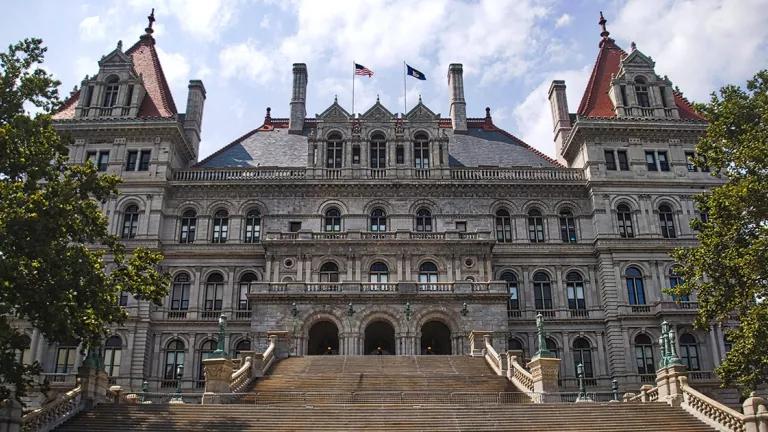Kicking Butts: NY Bill Proposes Banning Filtered Cigarettes
A new bill introduced in the New York State legislature would ban the sale of harmful filtered tobacco products, which are a known threat to human health and are destructive to our environment and waterways.

Filtered cigarettes and single-use e-cigarettes pollute our environment and pose a grave, well-known threat to public health.
And a new “Tobacco Product Waste Reduction Act” introduced in the New York State Legislature by New York State Senator Liz Krueger and Assemblymember Judy Griffin would ban the sales of these dangerous products.
Cigarette waste is a cancer to our environment
Cigarette butts have long been an eyesore littering public spaces. It is a common sight to see them littered in between cracks in a city sidewalk, strewn across a parking lot or washed up on a beach. Indeed, butts are the most collected trash item in beach and waterway clean-ups across the globe, accounting for at least 30% of all litter collected in coastal clean-up campaigns over the past three decades.
An estimated 4.5 trillion butts end up as litter every year—that’s a staggering 850,000 tons of cigarette litter, equivalent to around thirty times the weight of the Statue of Liberty.
Of course, cigarette litter is not only an unpleasant visual eyesore—it also poses a distinct environmental threat. The butt that remains after the tobacco in a cigarette is smoked includes the filter. And cigarette filters are made up of cellulose acetate, a plastic that is not biodegradable. That means that the plastic does not break down in natural processes; instead, it remains in our ecosystem, with longstanding impacts. In fact, it takes years for cellulose acetate to disappear from the environment.
To make things worse, the plastic pollutant found in cigarettes does not just sit on a beachfront forever. It moves far and wide—and has been found as far as the bottom of the deep sea. Over time, the cellulose acetate in cigarette filters leach out thousands of small synthetic fibers into their surrounding environment, polluting oceans and waterways. The plastic contaminant is toxic to crustaceans, worms, fish, birds, and other aquatic organisms, putting multiple levels of our ecology at risk. Fibers have been found in the stomachs of seabirds and fish. Indeed, fish consumption offers a clear example of how the toxin can move through the food chain. Like other microplastic contaminants, cigarette filter fibers add to the increasing degradation of oceans as they become sinks of plastic refuse.
Additionally, heavy metals including cadmium and arsenic are also associated with cigarette filter litter. These contaminants can accumulate in soil and also enter the food chain—posing yet another direct threat to public health.
Cigarettes are a well-known threat to human health
Smoking has been a known source of disease and death since the Surgeon General’s warning was first affixed to cigarette packaging in 1964. Our increasingly sophisticated understanding of the medical basis of lung disease and the link between smoking, lung cancer, and heart disease make the social costs of tobacco use even clearer. And the tobacco industry is cunning. As health advocates have attested for decades, it is a commercial enterprise that gets new consumers addicted to its products, knowing that its regular customers will, because of its very own products, have shorter lifespans.
Tobacco illness continues to be the leading cause of preventable death in the United States. Every year, just under half a million people die due to tobacco use, including over 30,000 New Yorkers.
Although filters may give the impression of a healthier product, they do not, in fact, make cigarettes safer. Filters do not improve impacts on smokers, nor do they lessen the destructive impact of tobacco use. They are simply a marketing device.
If anything, filters create a more dangerous product. Because the sensation of filtered smoking feels less harsh, smokers tend to smoke more of the product and inhale more deeply. Those deeper inhalations draw the carcinogens in the smoke further into the lung tissue.
The fight against the powerful tobacco industry has been a long one, waged by the medical profession, local governments, the FDA, and several generations of anti-tobacco activists. And it is ongoing; in 2017, the National Cancer Initiative called for the FDA to “consider regulating filter use,” including the consideration of a total ban.

Tobacco products are a well-known threat to public health. What's more, they also pollute our environment, contaminating waterways and poisoning aquatic life.
E-Cigarettes are no better
Filtered cigarettes are not the only cigarette product that threaten both environmental and public health. E-cigarettes may be equally detrimental. The lithium ion batteries contained in e-cigarette devices are an electronic waste product and likely a hazardous waste danger. Furthermore, the public health concerns regarding e-cigarette use are substantial—the particulate matter drawn into the user’s lungs upon inhalation can cause damage to the lung tissue and are harmful to all those exposed, including bystanders.
E-cigarettes would be included in the ban proposed by Senator Krueger and Assemblymember Griffin.
The Krueger-Griffin Ban
The Krueger-Griffin bill would simply ban outright sale of cigarettes with single-use filters and single-use e-cigarettes by 2023.
This bill represents an important battle in the ongoing war against the tobacco industry. This legislation would curtail access to deadly cigarette products, abolishing a product that kills its very own consumers. Passing this legislation is a worthwhile step that would strengthen New York’s commitment to a more robust public health system.




